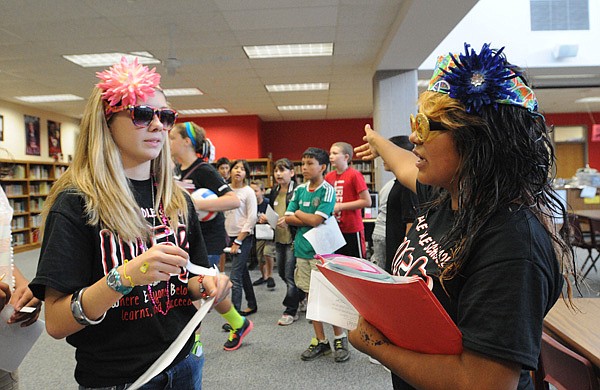Program Inspires Students
252 PUPILS ATTEND HALF-DAY ORIENTATION GUIDED BY PEERS
Lingle eighth-grade students Maddi Ware, left, and Selana Ramirez sport flower-girl outfits while leading new students on a tour of the school Friday Aug. 17 2012. Tour guides dressed in costume to make the event fun for incoming sixth-grade students.
Monday, August 20, 2012
ROGERS — Sixth grade is new to every student at one point.
Where Everyone Belongs, a pilot program launched this year at Greer Lingle Middle School, is trying to help students feel at home in time for today’s first day of school.
On Friday, 252 students arrived at school for a half-day orientation guided by their peers. They walked into the building to high-fives from seventh- and eighth-grade student volunteers, and the new students’ faces lit up, said Kim Kay, sixth-grade English teacher.
“It’s such a hard transition,” Kay said of the move to sixth grade. “Lockers, that’s the huge fear. Lots of tears are shed over lockers.”
Students got to know a small group of other sixth-graders and took a tour of the building where they received practice combinations to try a set of lockers. Parents attended an open house after the student session.
Rebecca Allen was puzzled when she first read the note telling her to drop off her son for orientation instead of walk him through the school.
Two of her other children attended Lingle, and although Allen and her son, Ritchard Hardee, are familiar with the building, Ritchard said he had a better sense of direction after the tour. Attending the orientation without a parent gives students a sense of independence, Allen said.
Teachers tell elementary students what to do, Allen said. That doesn’t happen when a child reaches middle school.
“No one is holding his hand,” she said.
Kenzie Alkinburgh, a sixth-grader, recently moved to Rogers and Friday was her first time inside her new school.
“At the beginning, I didn’t know where I was,” Kenzie said.
By noon she was comfortable with the building’s layout and looking forward to joining choir and, perhaps, becoming a WEB leader next year.
Teachers can spend the first couple of days of school just trying to help students get into their lockers, read their class schedules and find their way around the building, said Traci Sickels, an English as a second language teacher at Lingle and co-coordinator of the WEB program.
Using student volunteers builds leaders instead of followers, said Cheryl Turpin, an English as a second language teacher at Lingle and co-coordinator for the WEB program. It also has built excitement for back to school as 60 student volunteers showed up to help teachers prepare, and call their group members inviting them to the orientation.
WEB WATCH
Boomerang Project
The Santa Cruz, Calif.-based program, offers training and teacher support for two orientation programs: Link Crew for high schools and Where Everybody Belongs for middle schools.
For more information about the nationwide Boomerang Project, visit boomerangproject.com.
“We’re making future leaders,” Turpin said. “It puts accountability back on the student.”
Student volunteers had to apply, and grades were considered, but WEB leaders were nominated by other students, teachers and even parents.
“Our No. 1 criteria was being kind,” Turpin said.
Both Rogers high schools use a similar program called Link Crew to help students transition from middle school into high school. Both schools tested Link Crew last year. Lingle is the first middle school to adopt the WEB program.
Link Crew has made a difference at Rogers High School, said Charles Lee, assistant principal. Upperclassmen help freshmen learn the ropes, and that makes changing schools easier. Students also have the opportunity to make friends both within their group and with their group leaders.
Discipline referrals dropped last year, something Lee partially credits to the atmosphere created by connecting student mentors and freshmen.
“Obviously it is much easier to talk with another student instead of an adult,” Lee said.
